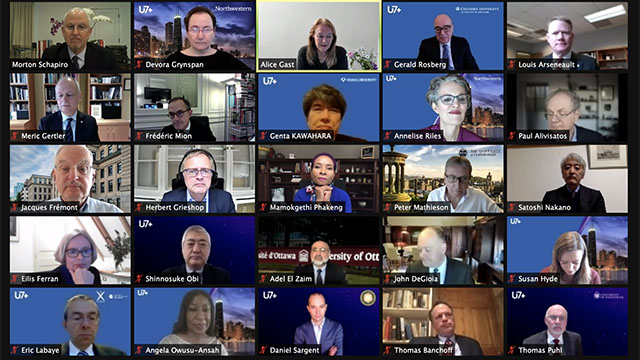
The annual U7+ Alliance of World Universities Presidential Summit brings together leaders from nearly 100 universities from around the world. This year’s summit, held virtually due to COVID-19 restrictions, was hosted by Northwestern University from Nov. 22-24. Members of McGill’s senior administration participated in the two-day dialogues, which revolved around the theme of intergenerational justice.
At the culmination of the summit, the leaders unanimously voted to work together, and to work with government leaders worldwide, to create new opportunities for mutual understanding and equitable resource sharing across generations. This commitment builds on previous U7+ Alliance commitments to tackle climate change, promote ethical uses of artificial intelligence and digital technology, and address other global issues.
In a collective statement on the unique role universities play in transmitting knowledge across generations and borders, the university leaders acknowledged “the current challenges facing youth around the world and the historic role of young people in calling for change and advancing equality and inclusiveness. We recognize that many of our greatest policy challenges are urgent matters of intergenerational justice.” The leaders spotlighted four areas that they feel are particularly importance to the goal of advancing intergenerational justice:
- training and nurturing responsible and active citizens
- addressing the world’s environmental issues through research and in leading by example
- combatting polarization in society and working toward equality and inclusiveness
- promoting interdisciplinary research and education and engaging with stakeholders to solve complex global issues
The 2020 Summit agenda was influenced in part by the first U7+ Worldwide Student Forum (held virtually from June 12-July 1, 2020), during which university students from the Americas, Europe, Asia and Africa set forth their recommendations for how universities can best prepare them for active engagement in efforts to address climate change, inequality, injustice, and other pressing global challenges.
“Our students increasingly feel a sense of generational imbalance in terms of who will pay the price for decisions made, or not made, by policymakers today,” said Ian Kelly, Northwestern University Ambassador-in-Residence and former U.S. Ambassador to Georgia and the Organization for Security and Cooperation in Europe. “As their elders postpone effective action to address issues like the climate crisis, mounting debt, economic inequity and racial injustice, the younger generation senses keen injustice: It is they who will have to face the consequences of action deferred.
“We all must understand this will negatively impact the democratic system that unites the G7 nations. At best, political apathy, and worst, support for other political ideologies, follow when a generation feels the present system does not allow them more participation in determining their own future.”
The U7+ Alliance is a coalition of university presidents from North America, South America, Europe, Asia, Africa and Australia dedicated to defining concrete actions universities can take to collectively address global challenges in coordination with government leaders in G7 countries and beyond.
